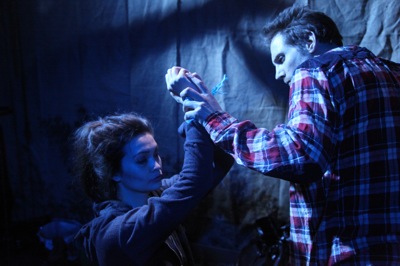
‘I am not a victim! Look at me, I’m not going to die here’ repeatedly calls out the Dying Girl in Colleen Murphy’s Pig Girl currently playing at the Finborough Theatre.
Inspired by recent murders in Canada, for which a pig farmer was convicted, Pig Girl gives voice to the sufferings of a murder victim, her anguished family and the police force who were largely responsible, for unsuccessfully finding the victim.

Kirsten Foster and Damien Lyne
It is a fine balance of voices that this writing evokes. The Dying Girl (played by Kirsten Foster) represents all of the un-named, un-identified victims of a serial killer, most of them native Canadians, from impoverished backgrounds, ‘society drop-outs’, drug addicts and sex workers. Throughout the 90 harrowing minutes it takes the victim to die, her voice is that of strength, resilience and courage. Foster’s acting however, though believable, seems to struggle at times with an insecure as well as slightly passive partner in the character of her rapist and killer (played by Damien Lyne). His voice in the play repeats dismissive, condemning attitudes of wider society, which alienates and ostracizes sex workers silently conforming to a wide spread inertia on the part of police force (although the original murderer was convicted for 6 murders, the DNA of a further, un-identifie, 27 women was found).
More in tune with each other seem to be the voices of the dying woman’s sister (played with understated passion by Olivia Darnley), who tries to convince a police officer (Joseph Rye) to look for her missing adopted sibling. Rye’s performance from the initially- dismissive attitude to a near nervous breakdown and sense of guilt is thoughtful and mature. In the tiny space of the Finborough they both speak directly to the audience rather than to each other, increasing the sense of no-response, frustration and helplessness.
The play is written with strength and heart. It stops short from making easy judgements on society but allows us a glimpse into the darkness and silence of ignored tragedy.
I say ‘darkness’ quite purposefully, as the torture/murder scene unveils on stage in semi darkness only partially explained by the setting in a barn at night. However, the fact that we cannot clearly see actors’ faces nor actions may well be a blessing in disguise, because the gruesome torture and rape is ‘illustrated’ by actors, as if they lack courage to tackle the scene naturalistically, but wish us to know that they thought it should have been staged in that manner. That frustrates simply because it weakens the case of victim’s sister and police officer, both struggling to discover the truth and to come to terms with the worst possible answer.
‘Turn your head and you’ll see me’ says again and again the Dying Girl in desperate attempt to stay alive. Apparently not, we won’t, for all the metaphorical reasons contained within the play, as well as practical (lighting design) failures of the production.
By Anna Mors

Leave a Reply